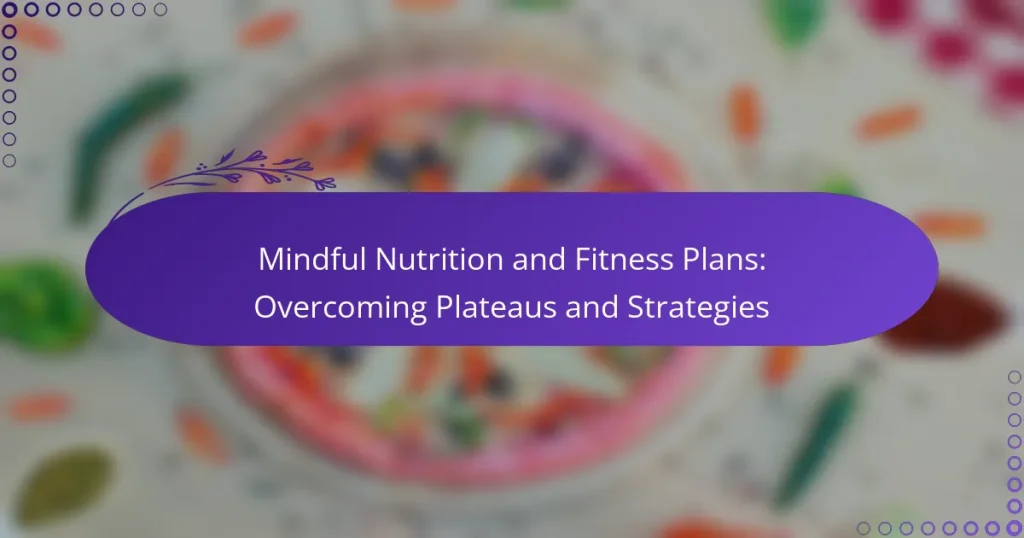Mindful nutrition plays a crucial role in enhancing fitness plans by encouraging healthier food choices and boosting energy levels. By focusing on meal quality and timing, individuals can optimize their performance and recovery. To overcome fitness plateaus, it’s essential to implement strategies that challenge the body, such as adjusting workout intensity and diversifying nutrition. These mindful practices not only promote progress but also support overall well-being.

How can mindful nutrition enhance fitness plans?
Mindful nutrition can significantly enhance fitness plans by promoting better food choices, improving energy levels, and supporting overall well-being. By focusing on the quality and timing of meals, individuals can optimize their physical performance and recovery.
Improved energy levels
Mindful nutrition helps maintain stable energy levels throughout the day, which is crucial for effective workouts. Consuming balanced meals that include complex carbohydrates, healthy fats, and proteins can provide sustained energy rather than quick spikes followed by crashes.
For example, incorporating whole grains, nuts, and lean proteins into meals can help prevent fatigue during exercise. Aim for meals that include a variety of food groups to ensure a steady release of energy.
Better recovery
Proper nutrition plays a vital role in recovery after workouts. Mindful eating encourages the intake of nutrients that aid muscle repair and reduce inflammation, such as omega-3 fatty acids and antioxidants found in fruits and vegetables.
To enhance recovery, consider consuming a meal or snack rich in protein and carbohydrates within 30 to 60 minutes post-exercise. This can include options like a smoothie with protein powder and berries or a turkey sandwich on whole-grain bread.
Enhanced mental clarity
Mindful nutrition can also lead to improved mental clarity, which is essential for maintaining focus during workouts and daily activities. Foods rich in omega-3 fatty acids, antioxidants, and vitamins can support cognitive function and mood.
Incorporating foods like fatty fish, leafy greens, and berries into your diet can help enhance mental performance. Staying hydrated is equally important; aim for adequate water intake throughout the day to support cognitive health and physical performance.

What strategies help overcome fitness plateaus?
To overcome fitness plateaus, implement strategies that challenge your body in new ways, such as adjusting training intensity, diversifying workouts, and modifying nutrition. These approaches can stimulate progress and help you break through stagnation.
Progressive overload techniques
Progressive overload involves gradually increasing the demands placed on your body during exercise. This can be achieved by increasing weights, repetitions, or intensity over time. Aim for small increments, such as 5-10% increases in weight or adding an extra set each week.
Track your workouts to ensure consistent progression. A common pitfall is increasing too quickly, which can lead to injury. Focus on form and listen to your body to find the right balance between challenge and safety.
Incorporating cross-training
Cross-training involves engaging in different types of workouts to enhance overall fitness and prevent boredom. For example, if you primarily run, consider adding cycling or swimming to your routine. This not only helps to work different muscle groups but also reduces the risk of overuse injuries.
Try to incorporate at least one cross-training session per week. This variety can rejuvenate your motivation and provide a fresh stimulus for your body, making it easier to push past plateaus.
Adjusting macronutrient ratios
Adjusting your macronutrient ratios can support your fitness goals and help overcome plateaus. For instance, increasing protein intake may aid in muscle recovery and growth, while adjusting carbohydrates can fuel your workouts. A common approach is to aim for a balanced intake of approximately 30% protein, 40% carbohydrates, and 30% fats, but these ratios can vary based on individual needs and goals.
Monitor your energy levels and performance as you make these adjustments. If you find yourself feeling fatigued or not recovering well, consider tweaking your ratios again. Consulting with a nutritionist can provide personalized guidance tailored to your specific fitness objectives.

Which mindful nutrition practices are effective?
Effective mindful nutrition practices focus on enhancing awareness of food choices and eating habits. These strategies can help individuals break through plateaus in their fitness journeys by promoting healthier eating patterns and improving overall well-being.
Meal prepping
Meal prepping involves planning and preparing meals in advance to ensure healthier options are readily available. This practice can save time during busy weeks and reduce the temptation to opt for unhealthy convenience foods.
To start meal prepping, choose a day to cook large batches of nutritious meals. Store them in portioned containers in the fridge or freezer. Aim for a balance of proteins, whole grains, and vegetables to create satisfying meals.
Mindful eating techniques
Mindful eating techniques encourage individuals to focus on the experience of eating, which can lead to better food choices and portion control. This practice involves paying attention to hunger cues, savoring each bite, and minimizing distractions during meals.
To practice mindful eating, try slowing down your eating pace and chewing food thoroughly. Setting aside time to eat without screens or multitasking can enhance awareness of flavors and textures, making meals more enjoyable and satisfying.
Tracking food intake
Tracking food intake involves recording what you eat to gain insights into your dietary habits. This practice can help identify patterns, portion sizes, and areas for improvement, making it easier to overcome plateaus.
Consider using a food diary or mobile app to log meals and snacks. Aim to track for at least a week to gather enough data for analysis. Look for trends in your eating habits, such as high-calorie snacks or missed meals, and adjust accordingly to meet your nutrition goals.

How to select a personalized fitness plan?
Selecting a personalized fitness plan involves understanding your unique goals, current fitness level, and lifestyle factors. A tailored approach ensures that the plan aligns with your needs, making it more effective and sustainable over time.
Assessing fitness goals
Begin by clearly defining your fitness goals. Whether you aim to lose weight, build muscle, improve endurance, or enhance overall health, having specific targets will guide your plan selection. Consider using the SMART criteria—specific, measurable, achievable, relevant, and time-bound—to refine your objectives.
For example, instead of saying “I want to get fit,” specify “I want to run a 5K in under 30 minutes within three months.” This clarity helps in choosing the right activities and tracking progress effectively.
Evaluating current fitness level
Assessing your current fitness level is crucial for selecting an appropriate plan. This can involve measuring your endurance, strength, flexibility, and body composition. Simple tests, like a timed mile run or push-up count, can provide insights into your starting point.
Be honest about your abilities to avoid frustration and injury. If you’re new to exercise, consider starting with beginner-friendly routines, while more experienced individuals might opt for advanced programs that challenge their limits.
Considering lifestyle factors
Your lifestyle plays a significant role in determining the best fitness plan. Consider factors such as your daily schedule, work commitments, and family responsibilities. A plan that fits seamlessly into your routine is more likely to be successful.
For instance, if you have limited time during weekdays, you might prefer shorter, high-intensity workouts or weekend sessions. Additionally, think about your access to facilities or equipment, as this can influence your exercise options.

What role does hydration play in fitness?
Hydration is crucial for fitness as it supports bodily functions, enhances performance, and aids recovery. Proper fluid intake helps maintain optimal physiological processes, ensuring that your body can perform at its best during workouts and recover effectively afterward.
Supports metabolic functions
Hydration plays a vital role in metabolic functions, including digestion and nutrient absorption. Water is necessary for breaking down food and transporting nutrients throughout the body. Aim for at least 2 to 3 liters of water daily, adjusting based on activity level and climate.
Dehydration can slow metabolism, making it harder to lose weight or maintain energy levels. Regularly drinking water, especially before meals, can help manage appetite and support metabolic efficiency.
Affects exercise performance
Hydration directly impacts exercise performance by regulating body temperature and maintaining endurance. Even mild dehydration can lead to decreased strength, stamina, and overall performance. It’s recommended to drink water before, during, and after workouts to stay hydrated.
For prolonged or intense workouts, consider electrolyte-replenishing drinks. A general guideline is to consume about 500-700 ml of fluid two hours before exercise and continue sipping throughout the activity.
Helps in recovery
Post-exercise hydration is essential for recovery, as it aids in muscle repair and reduces soreness. Water helps flush out toxins and supports the transportation of nutrients needed for recovery. Aim to drink at least 500 ml of water within 30 minutes after exercising.
Incorporating foods with high water content, such as fruits and vegetables, can also enhance recovery. Be mindful of your hydration levels, especially after intense workouts, to ensure your body can recover effectively and prepare for the next session.

How can local resources support mindful nutrition?
Local resources can significantly enhance mindful nutrition by providing access to fresh foods, educational programs, and community support. Utilizing these resources helps individuals make informed dietary choices while fostering a supportive environment for healthy living.
Community fitness classes in Los Angeles
Los Angeles offers a variety of community fitness classes that cater to different interests and fitness levels. These classes often focus on holistic approaches to health, combining physical activity with nutrition education to promote overall well-being.
Many community centers and parks in Los Angeles host free or low-cost fitness classes, such as yoga, Zumba, and boot camps. Participating in these classes not only improves physical fitness but also encourages social interaction, which can enhance motivation and accountability.
To find classes, check local community boards, social media groups, or websites like Meetup. Look for classes that align with your fitness goals and schedule, and consider trying a few different options to see what resonates best with you.


